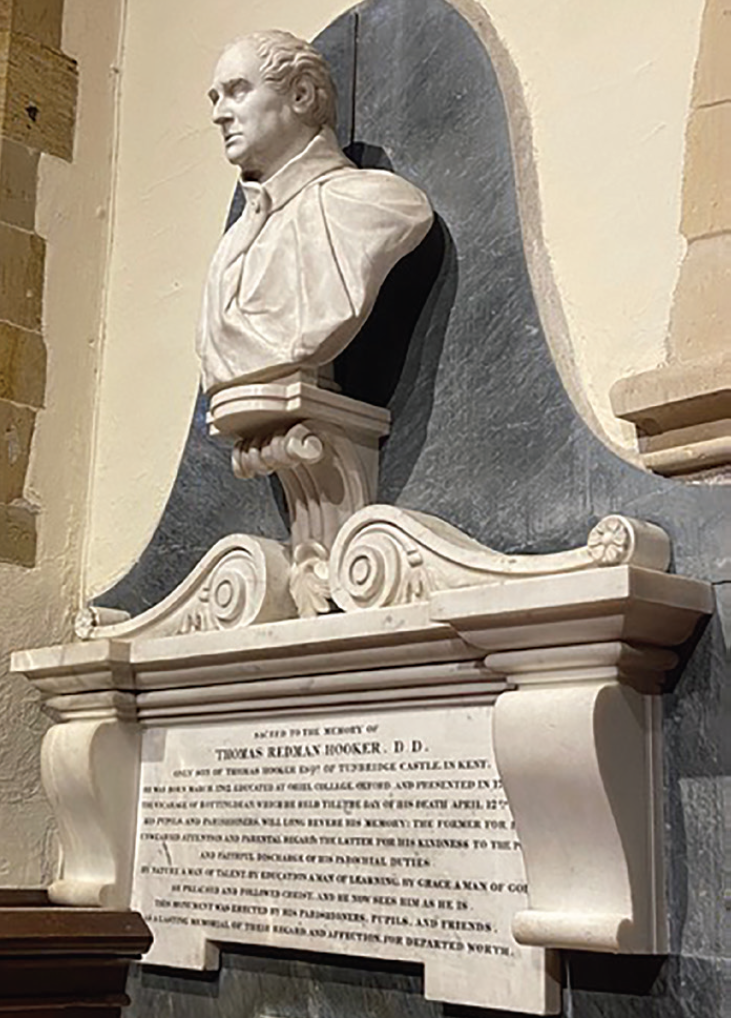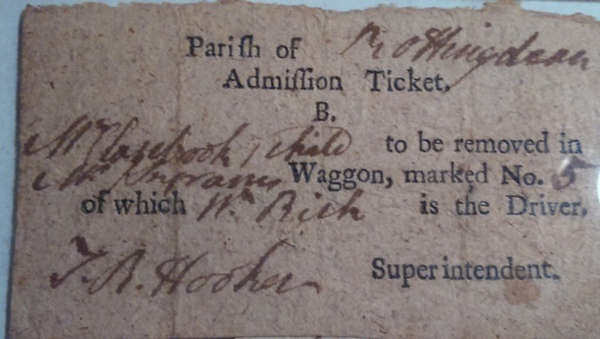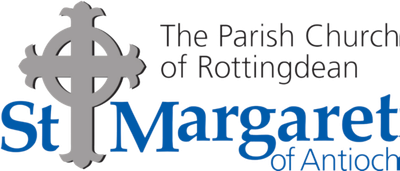50

Inside the church it is hard to avoid spotting the monumental tribute to The Reverend Dr Hooker, 1762-1838 [50] priest, musician, schoolmaster, smuggler, Country Gentleman and Master of the Hunt. A separate leaflet about his life is available In the Church.
It has always been rumoured that Hooker acted a a 'look-out man' for local village smugglers - using a tunnel running from underneath the vicarage to the beach. But this has (perhaps for obvious reasons) never been fully verified. His first wife was a cousin of Jane Austin, one of his school pupils was Lord Lytton, author of the immortal contribution to English literature; "It was a dark and stormy night..." and Hooker personally devised an emergency plan for the residents of Rottingdean in case of a Napoleonic invasion - each villager being given a numbered ticket allocating a seat in a named farm cart with a named driver for the purposes of evacuation.
 A numbered evacuation ticket, signed by Hooker, courtesy of Rottingdean Preservation Society's archive.
A numbered evacuation ticket, signed by Hooker, courtesy of Rottingdean Preservation Society's archive.
Much of the following is taken directly from 'The Remarkable History of Rottingdean' by local writer Derek Heater...
The fame of all Rottingdean incumbents pales before that of Thomas Redman Hooker. He was vicar from 1792 to 1838. A somewhat lager-than-life character, he would seem to have been well-loved by his parishioners, who supplied the Brighton Herald with a touching doggerel obituary. The opening couplets reveal the tone:
How chang'd, alas! is now dear Rottingdean!
Where not one smiling face is to be seen;
Ask you the reason? We reply anon,
Our kind and much lov'd pastor! He is gone!
Hooker, while briefly secretary to the Duke of Dorset, Hooker 'won' the parish of Rottingdean (which was in the Duke's gift) via the roll of a dice. The new vicar was a man of many parts. As a young man he was described as 'skilled in vocal and instrumental music, a good draughtsman, excellent in cricket, swimming and skating, a fine writer...''.
(Story has it that once, Hooker broke his arm riding an so had his cello restrung so that he could play it left-handed.)
During his long and happy life in Rottingdean, Hooker pursued three callings simultaneously - as a benevolent parson, an inspiring teacher and an indefatigable huntsman.
Hooker was indeed a very keen teacher, and it was as a teacher that his fame spread far beyond Rottingdean and indeed beyond Sussex. He started both day and Sunday schools for the village children , the Sunday school being one of the first in the country. But his fame rested on the school he established in the vicarage (now The Grange [view]), which he extended or his pedagogical purposes. Later he expanded his classes to an annex, the present day St. Aubyn's [view]. His school gained a fine reputation and attracted the sons of many wealthy and distinguished families.
Hooker summed up his school regime as a combination of cricket and beef.
As a huntsman he rode thrice weekly with the famous Brookside Harriers, which were later kennelled in Rottingdean. He was master between 1800 - 1820.



